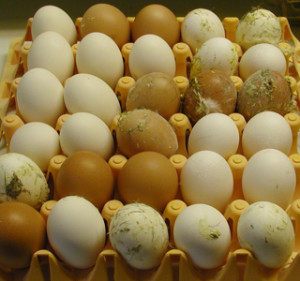The national salmonella outbreak which has struck down nearly 250 people across Britain could be traced back to a single source of eggs, health investigators have said.
 Earlier this month, three hospital patients affected by the salmonella outbreak in Birmingham died. But the infection was not cited as a contributing factor on the death certificates of two patients and the coroner’s report on the third patient has not yet been delivered.
Earlier this month, three hospital patients affected by the salmonella outbreak in Birmingham died. But the infection was not cited as a contributing factor on the death certificates of two patients and the coroner’s report on the third patient has not yet been delivered.
Health officials said there have been 158 cases reported in the past week alone – since August 15 – but said these are not new infections but historical cases and that the reporting of new infections had in fact slowed down.
The UK Food Standards Agency decided to remind caterers to:
• keep eggs away from other foods, when they are still in the shell and when you have cracked them open;
• don’t use damaged or dirty eggs;
• be careful not to splash raw egg onto other foods, surfaces or dishes;
• if you are breaking eggs to use later (sometimes called ‘pooling’) keep the liquid egg in the fridge and take out small amounts as needed;
• use all ‘pooled’ liquid egg on the same day and don’t add new eggs to top it up;
• cook eggs and foods containing eggs thoroughly (piping hot?);
• use pasteurised egg for raw or lightly cooked foods;
• always wash and dry your hands thoroughly after touching eggs or working with them;
• clean food areas, dishes and utensils thoroughly and regularly, using warm soapy water, after working with eggs (doesn’t have to be warm, just soapy); and,
• serve egg dishes straight away, or cool them quickly and keep chilled
In Denmark, food authority Fødevarestyrelsen has ordered Hedegaard Foods to recall eggs and a number of egg-based products following the discovery of Salmonella in some of its goods.
According to a Fødevarestyrelsen statement, the company found the bacteria in cages during its own inspections at a farm in Grindsted in central Jutland.
Pasteurised egg products made by the company are also being recalled as Salmonella can survive pasteurisation.
